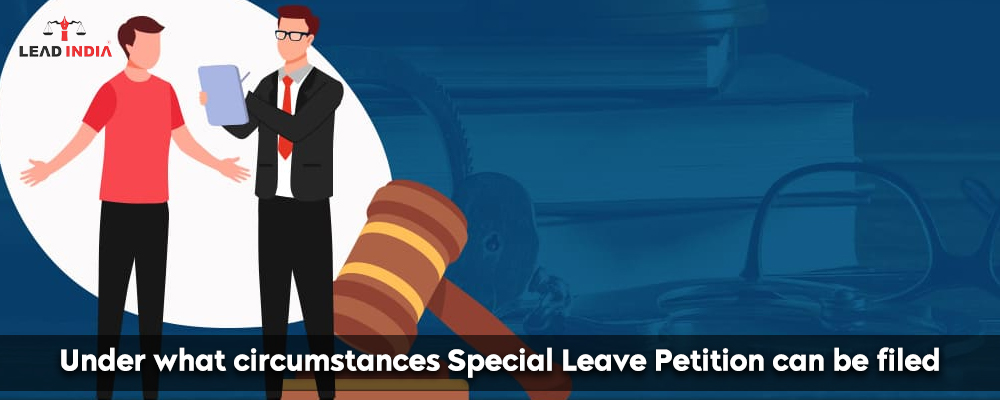A Special Leave Petition (SLP) is unique in the Indian legal system since it offers a remarkable remedy to those who are seeking justice outside of the regular judicial channels. An SLP is a discretionary remedy that, when filed with the Supreme Court of India, enables the highest court to use its authority in extraordinary situations.
Need A Legal Advice
The internet is not a lawyer and neither are you. Talk to a real lawyer about your legal issue

Special Leave Petition: About
A Special Leave Petition is a discretionary remedy granted under Article 136 of the Constitution of India, empowering the Supreme Court to grant special leave to appeal from any judgment, ruling, verdict, sentence, or order in any case or subject rendered by any tribunal or court operating within the borders of India. Unlike appeals, where there is an automatic right to appeal against certain orders, an SLP is not a matter of right but a matter of judicial discretion.
Circumstances of Filing Special Leave Petition
Substantial Question of Law:
- One of the primary grounds for filing a Special Leave Petition is the existence of a substantial question of law.
- The term ‘substantial’ implies a question of general importance, having a significant bearing on the legal rights of the parties involved.
- The Supreme Court is inclined to entertain SLPs when the interpretation of law or legal provisions is in question, and the matter has far-reaching consequences.
Violation of Fundamental Rights:
- If there is an alleged infringement of fundamental rights guaranteed under the Constitution of India, an individual may approach the Supreme Court through an SLP.
- This is especially relevant when other legal remedies have been exhausted or are not considered adequate to address the violation of fundamental rights.
Errors Apparent on the Face of Record:
- The Supreme Court may consider an SLP when there are errors that are apparent on the face of the record.
- This implies mistakes or errors in the judgment or order that are evident without delving into the merits of the case.
- It is crucial for the petitioner to demonstrate that the error is not merely a matter of interpretation but is glaring and affects the outcome of the case.
Jurisdictional Errors:
- Cases where there is an alleged error in the exercise of jurisdiction by a lower court or tribunal can be grounds for filing an SLP.
- This includes instances where a court has exceeded its authority or has failed to exercise jurisdiction when required.
- The Supreme Court may intervene to correct jurisdictional errors in the interest of justice.
Public Interest Litigation (PIL):
- Public Interest Litigation is a powerful tool for citizens to bring matters of public concern to the attention of the judiciary.
- When a matter affects the public at large or involves issues of constitutional importance, the Supreme Court may entertain an SLP filed as a PIL.
- The court may intervene to protect and enforce the fundamental rights of citizens or to address larger societal issues.
Procedure for filing a Special Leave Petition
- The first step in filing an SLP involves the drafting of the petition. The petitioner, usually through legal counsel, prepares a document outlining the facts of the case, the questions of law involved, and the grounds on which special leave is sought. The importance of clarity and precision cannot be overstated in the drafting process.
- Once the SLP is drafted, it is filed in the Supreme Court of India. The petitioner must pay the requisite court fees and adhere to procedural requirements. The SLP is typically accompanied by supporting documents, including certified copies of the impugned judgment or order and any other relevant evidence.
- The Supreme Court, upon reviewing the SLP, may choose to grant or refuse special leave. If granted, the court may admit the SLP and proceed to hear the substantive issues raised in the petition. If refused, the SLP comes to an end, and the petitioner may not proceed further with the case in the Supreme Court.
- If special leave is granted, the Supreme Court sets a date for the hearing of the SLP. During the hearing, the petitioner’s counsel presents arguments, relying on legal precedents and statutes to support their case. The respondent, represented by their counsel, has the opportunity to counter these arguments.
- Following the hearing, the Supreme Court delivers a judgment or order. The court may either uphold or overturn the decision of the lower court or tribunal. The judgment passed in an SLP is final and binding. In some cases, the Supreme Court may remand the matter back to the lower court for fresh consideration.
The Special Leave Petition, a pillar of the constitutional framework, is evidence of the judiciary’s dedication to enforcing justice and the rule of law.
One can talk to a lawyer from Lead India for any kind of legal support. In India, free legal advice online can be obtained at Lead India. Along with receiving free legal advice online, one can also ask questions to the experts online free through Lead India.




 Talk to a Lawyer
Talk to a Lawyer